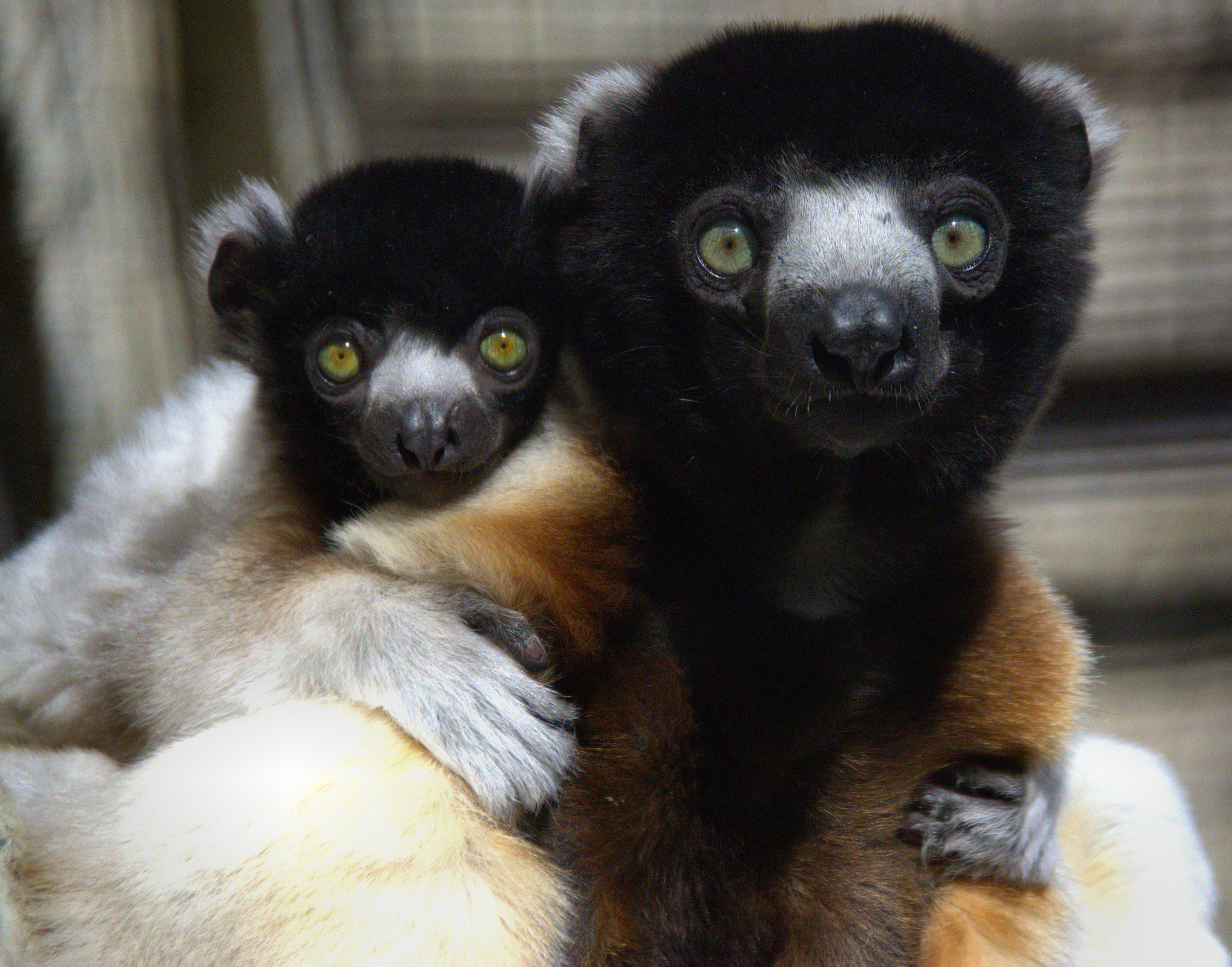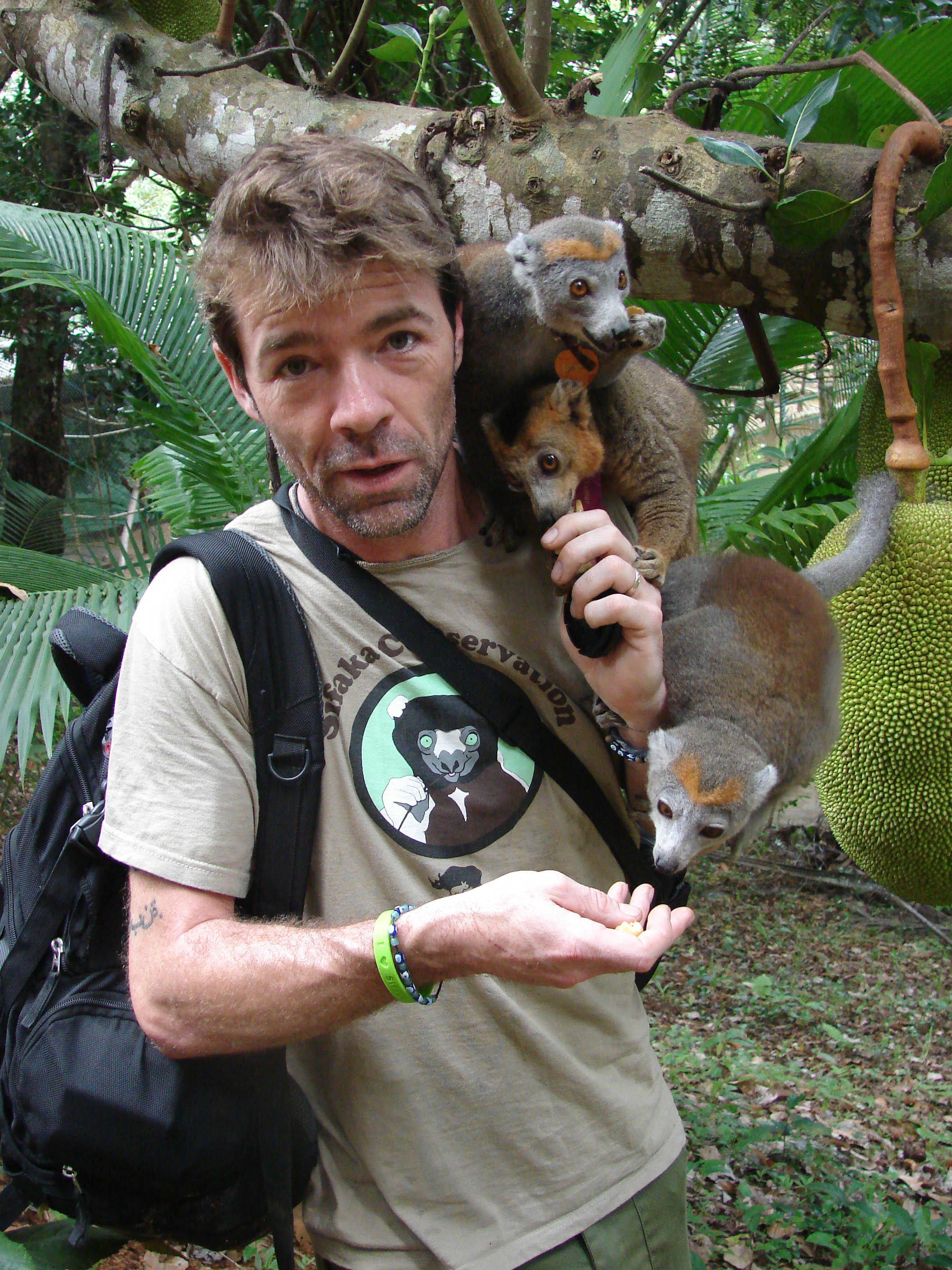Located just two miles from Burford, off the A361, the Cotswold Wildlife Park is an inspirational place to visit, whatever your age. Not only are the gardens through which you walk well maintained and beautifully planted, but you will be able to view one of the largest zoological collections in the UK, home to small and large mammals, primates, reptiles, amphibians and birds. A visit to the Park will not only provide a fun day out and an educational experience too but will help support the work that the Cotswold Wildlife Park Conservation Trust (a registered charity since August 2013), undertakes to conserve animal species and endangered environments.
 Each year, from 25 May to 2 June, the Cotswold Wildlife Park hosts its annual conservation event: ‘Lemur Week’. Their aim is to raise awareness and funds to help save the world’s most endangered Lemurs in their native homeland of Madagascar. Just ahead of ‘Lemur Week,’ the Primate team were thrilled to announce two new additions to its ever-growing Lemur troop - the birth of Ring-tailed Lemur twins. These new arrivals bring the total number of Lemur breeding successes in the Park’s walk-through Lemur exhibit, Madagascar, to an impressive 70 since it officially opened in 2008. Madagascar was the brainchild of Jamie Craig, General Manager of Cotswold Wildlife Park and TV presenter and comedian Ruby Wax officially opened the exhibit. Madagascar is a revolutionary way of seeing the island's many fascinating and endangered animals at close quarters, in a large, open-air exhibit.
Each year, from 25 May to 2 June, the Cotswold Wildlife Park hosts its annual conservation event: ‘Lemur Week’. Their aim is to raise awareness and funds to help save the world’s most endangered Lemurs in their native homeland of Madagascar. Just ahead of ‘Lemur Week,’ the Primate team were thrilled to announce two new additions to its ever-growing Lemur troop - the birth of Ring-tailed Lemur twins. These new arrivals bring the total number of Lemur breeding successes in the Park’s walk-through Lemur exhibit, Madagascar, to an impressive 70 since it officially opened in 2008. Madagascar was the brainchild of Jamie Craig, General Manager of Cotswold Wildlife Park and TV presenter and comedian Ruby Wax officially opened the exhibit. Madagascar is a revolutionary way of seeing the island's many fascinating and endangered animals at close quarters, in a large, open-air exhibit.
The Park is also the only zoological collection in the world to have bred the critically endangered Greater Bamboo Lemur in the last twelve months (only seven other zoological collections in the world keep this threatened species). In 2017 Cotswold Wildlife Park made history when it became the first zoological collection in Great Britain to successfully breed the critically endangered Crowned Sifaka (a species recently featured in BBC One's Mammals series).
 Cotswold Wildlife Park funds two major Lemur conservation projects in Madagascar: Impact Madagascar (impactmadagascar.org) and Helpsimus (helpsimus.org/en/homepage-helpsimus). Impact Madagascar focuses on the conservation of Crowned Sifaka and works with the people of Madagascar to provide solutions for the problems of deforestation, pollution and poverty. Helpsimus is committed to the conservation of Greater Bamboo Lemurs and protecting Madagascar’s biodiversity in cooperation with local communities. In February 2024 Helpsimus reported that the population of Greater Bamboo Lemurs protected by the project has almost tripled in 10 years - an exceptional result considering this species was on the brink of extinction some 15 years ago. In 2022, following a visit to the Park, Simon Cowell and Lauren Silverman generously donated to the Cotswold Wildlife Park Conservation Trust. Their donation helped fund a new research centre for Helpsimus. All funds raised during ‘Lemur Week’ go directly towards Lemur conservation.
Cotswold Wildlife Park funds two major Lemur conservation projects in Madagascar: Impact Madagascar (impactmadagascar.org) and Helpsimus (helpsimus.org/en/homepage-helpsimus). Impact Madagascar focuses on the conservation of Crowned Sifaka and works with the people of Madagascar to provide solutions for the problems of deforestation, pollution and poverty. Helpsimus is committed to the conservation of Greater Bamboo Lemurs and protecting Madagascar’s biodiversity in cooperation with local communities. In February 2024 Helpsimus reported that the population of Greater Bamboo Lemurs protected by the project has almost tripled in 10 years - an exceptional result considering this species was on the brink of extinction some 15 years ago. In 2022, following a visit to the Park, Simon Cowell and Lauren Silverman generously donated to the Cotswold Wildlife Park Conservation Trust. Their donation helped fund a new research centre for Helpsimus. All funds raised during ‘Lemur Week’ go directly towards Lemur conservation.

Along with their Lemur success story, the Cotswold Wildlife Park is also home to the biggest Binturong group in the UK. Due to its bizarre appearance and sweet-smelling aroma – the Binturong (Arctictis binturong), are also known as Bearcats. Originating from the rainforests of south-east Asia, they are related to small forest predators like Fossas, Civets and Genets. Binturongs are also the only creature to emit a completely unique scent which smells like buttered popcorn. Cotswold Wildlife Park is committed to the conservation of these wonderful creatures and on 11 May, the Park took part in World Binturong Day – a worldwide event to raise awareness for this rare and endangered mammal. Binturong numbers have declined by 30% in the last 20 years. They are listed as “Vulnerable” on the International Union for the Conservation of Nature’s (IUCN) Red List of Threatened Species. Main threats to their survival include deforestation to make way for palm oil, rubber and teak plantations. They are also sold as pets or used for their fur and meat in the illegal wildlife trade. All funds raised on World Binturong Day at the Cotswold Wildlife Park went to ABConservation (abconservation.org/en)
 Since their arrival at the Park six years ago, keepers have achieved remarkable breeding success with this species, so much so that the Park is now home to the biggest group of Binturong in the country. Assistant Animal Manager at Cotswold Wildlife Park, Chris Kibbey, explains: “Since introducing our Binturong pair in 2018, they have been doing a fantastic job of contributing to the captive breeding programme. In 2023, they produced their 8th and 9th kits here at the Park. Young from previous years have already gone to other zoological collections which helps to maintain the captive ‘safety net’ for this vulnerable civet species. We are proud to boast that with six individuals, we currently have the largest group of Binturongs in the UK”.
Since their arrival at the Park six years ago, keepers have achieved remarkable breeding success with this species, so much so that the Park is now home to the biggest group of Binturong in the country. Assistant Animal Manager at Cotswold Wildlife Park, Chris Kibbey, explains: “Since introducing our Binturong pair in 2018, they have been doing a fantastic job of contributing to the captive breeding programme. In 2023, they produced their 8th and 9th kits here at the Park. Young from previous years have already gone to other zoological collections which helps to maintain the captive ‘safety net’ for this vulnerable civet species. We are proud to boast that with six individuals, we currently have the largest group of Binturongs in the UK”.
The Park’s adult Binturong pair, Dobby and Himala, were introduced to each other in 2018 and soon formed a strong bond. In late 2019, Himala gave birth to her first cub. Named Coconut, she made her public debut in a rather unusual way. Born in seclusion inside the nest box, she spent several weeks out of sight. When she eventually began to venture outside into the outdoor exhibit, lockdown was announced and for the first time in the Park’s history, a newborn made her debut not in front of visitors, but exclusively on social media. A video diary of Coconut’s development was filmed for visitors to enjoy and keep up to date, with her progress until the Park eventually reopened when lockdown rules were eased. The latest additions to join the ever-growing Binturong family are twins Barry and Bennie). Both were born in 2023 and are on show to visitors in the Binturong exhibit opposite the Insect and Invertebrate House.
Cotswold Wildlife Park is open daily from 10am – 6pm during summer, with last admission at 4.00pm. To find out more and book your tickets, please visit
cotswoldwildlifepark.co.uk |@CotsWildTweets | facebook.com/cotswoldwildlifepark








